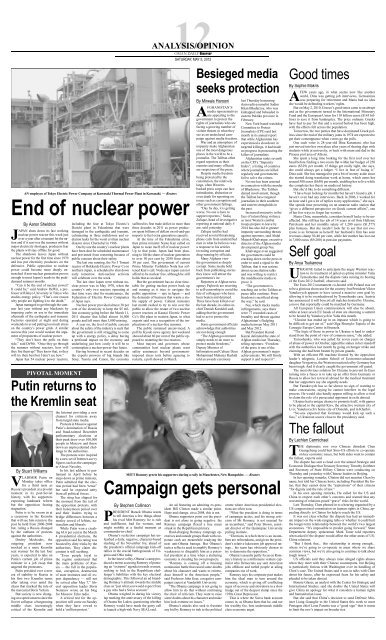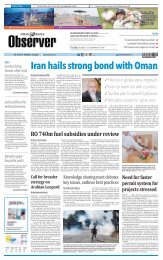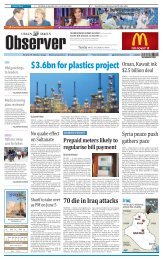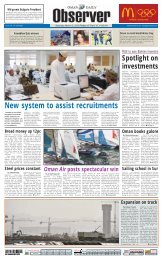Observer & Busness 5 May 2012 - Oman Daily Observer
Observer & Busness 5 May 2012 - Oman Daily Observer
Observer & Busness 5 May 2012 - Oman Daily Observer
You also want an ePaper? Increase the reach of your titles
YUMPU automatically turns print PDFs into web optimized ePapers that Google loves.
AN employee of Tokyo Electric Power Company at Kawasaki Thermal Power Plant in Kawasaki. — Reuters<br />
End of nuclear power<br />
By Aaron Sheldrick<br />
JAPAN shuts down its last working<br />
nuclear power reactor this week just<br />
over a year after a tsunami hit the nation<br />
and if it survives the summer without<br />
major electricity shortages, producers fear<br />
the plants will stay offline for good.<br />
The shutdown leaves Japan without<br />
nuclear power for the first time since 1970<br />
and has put electricity producers on the<br />
defensive. Public opposition to nuclear<br />
power could become more deeply entrenched<br />
if non-nuclear generation proves<br />
enough to meet Japan’s needs in the peakdemand<br />
summer months.<br />
“Can it be the end of nuclear power?<br />
It could be,” said Andrew DeWit, a professor<br />
at Rikkyo University in Tokyo who<br />
studies energy policy. “That’s one reason<br />
why people are fighting it to the death.”<br />
Japan managed to get through the summer<br />
last year without any blackouts by<br />
imposing curbs on use in the immediate<br />
aftermath of the earthquake and tsunami.<br />
Factories operated at night and during<br />
weekends to avoid putting too much stress<br />
on the country’s power grids. A similar<br />
success this year would weaken the argument<br />
of proponents of nuclear power.<br />
“They don’t have the polls on their<br />
side,” said DeWit. “Once they go through<br />
the summer without reactors, how will<br />
they fire them up? They know that, so they<br />
will try their best but I don’t see how.”<br />
Japan has 54 nuclear power reactors,<br />
PIVOTAL MOMENT<br />
Putin returns to<br />
the Kremlin seat<br />
By Stuart Williams<br />
VLADIMIR Putin on<br />
Monday takes office<br />
for a third term as<br />
Russia’s president at a pivotal<br />
moment in its post-Soviet<br />
history, with his supporters<br />
expecting landmark reform<br />
but the opposition fearing<br />
stagnation.<br />
Putin is to be sworn in at<br />
a ceremony in the Kremlin<br />
that will see him return to the<br />
post he held from 2000-2008<br />
but, ruling a Russia changed<br />
by the outburst of protests<br />
against the authorities.<br />
Dmitry Medvedev, the<br />
outgoing president now<br />
mocked as a mere Kremlin<br />
seat warmer for the last four<br />
years, is expected to take on<br />
Putin’s current job of prime<br />
minister in a job swap that<br />
angered the protesters.<br />
Putin presided over a new<br />
era of stability in Russia in<br />
his first two Kremlin terms<br />
after taking over amid the<br />
chaos that marked the rule of<br />
the mercurial Boris Yeltsin.<br />
But society is now changing<br />
at a speed unseen since the<br />
Soviet collapse: a burgeoning<br />
middle class increasingly<br />
critical of the Kremlin and<br />
including the four at Tokyo Electric’s<br />
Daiichi plant in Fukushima that were<br />
damaged in the earthquake and tsunami,<br />
culminating in three meltdowns and radiation<br />
leaks for the worst civilian nuclear<br />
disaster since Chernobyl in 1986.<br />
One by one the country’s nuclear plants<br />
have been shut for scheduled maintenance<br />
and prevented from restarting because of<br />
public concern about their safety.<br />
The last one running, the No 3 Tomari<br />
reactor of Hokkaido Electric Power Co in<br />
northern Japan, is scheduled to shut down<br />
early tomorrow. Anti-nuclear activists<br />
will celebrate over the week.<br />
The last time Japan went without nuclear<br />
power was in <strong>May</strong> 1970, when the<br />
country’s only two reactors operating at<br />
that time were shut for maintenance, the<br />
Federation of Electric Power Companies<br />
of Japan says.<br />
Nuclear power provided almost 30 per<br />
cent of the electricity to keep the $5 trillion<br />
economy going before the March 11,<br />
2011 disaster that killed almost 16,000<br />
people and left more than 3,000 missing.<br />
A year on, the level of public concern<br />
about the safety of the industry is such that<br />
the government is still struggling to come<br />
up with a energy policy, a delay having<br />
a profound impact on the economy and<br />
underlining just how costly it will be to<br />
contemplate a nuclear-power-free future.<br />
Having boomed in recent decades on<br />
the exports prowess of big brands like<br />
Sony, Toyota and Canon, the economy<br />
the Internet providing a new<br />
channel for criticism away<br />
from turgid state media.<br />
Protests in Moscow against<br />
Putin’s domination of Russia<br />
and fraud-tainted December<br />
parliamentary elections at<br />
their peak drew over 100,000<br />
people in Moscow and threw<br />
down an unprecedented challenge<br />
to the authorities.<br />
The protests were inspired<br />
by a new set of Internet-savvy<br />
figures such as the campaigner<br />
Alexei Navalny.<br />
In his last address to parliament<br />
in April before he<br />
steps down as prime minister,<br />
Putin admitted that the election<br />
period had been “tense”<br />
but said he expected unity<br />
from all political forces.<br />
The sting has slipped for<br />
the moment from the tail of<br />
the opposition protests, with<br />
their honeymoon period over<br />
and their leaders trying to<br />
bridge differences between a<br />
motley crowd of leftists, nationalists<br />
and liberals.<br />
While Putin won a crushing<br />
63.6 per cent in the March<br />
4 presidential elections, the<br />
opposition said his rating was<br />
boosted by dirty tricks by the<br />
authorities. They claim discontent<br />
is still seething.<br />
“Even people loyal to<br />
the regime understand that<br />
the main problems of Russia<br />
— the fall in the population,<br />
corruption, destruction<br />
of state institutes and oil export<br />
dependency — will not<br />
be solved after <strong>May</strong> 7,” liberal<br />
opposition leader Boris<br />
Nemtsov wrote on his blog<br />
for Moscow Echo radio.<br />
A critical test for the opposition<br />
will come on Sunday<br />
when they have vowed to<br />
hold a ‘million protest.’<br />
12<br />
ANALYSIS/OPINION<br />
OMAN DAILY <strong>Observer</strong><br />
suffered its first trade deficit in more than<br />
three decades in 2011 as power producers<br />
spent billions of dollars on oil-and-gas<br />
imports to fuel extra generation capacity.<br />
At the time of the Fukushima crisis,<br />
then prime minister Naoto Kan called on<br />
Japan to wean itself off of nuclear power.<br />
Up to that point, Japan had been planning<br />
to lift the share of nuclear generation<br />
to over 50 per cent by 2030 from about<br />
30 per cent. The government of current<br />
Prime Minister Yoshihiko Noda has softened<br />
Kan’s call. Noda says Japan can not<br />
afford to be nuclear free, although he still<br />
holds that as an ideal.<br />
But the government has no clear timetable<br />
for getting nuclear power back up<br />
and running as it tries to navigate the<br />
public opposition — rare in Japan — and<br />
the demands of business that wants a stable<br />
supply of power. Cabinet ministers<br />
last month rushed to try to win over the<br />
public to allow the restart of two nuclear<br />
power reactors at Kansai Electric Power<br />
Co’s Ohi plant in western Japan, in what<br />
experts said was a recognition of the implications<br />
of a nuclear-free summer.<br />
The public remained unconvinced. A<br />
poll by Kyodo news agency last weekend<br />
showed about 60 per cent of the public opposed<br />
to restarting the two reactors.<br />
Most mayors and governors whose<br />
communities host nuclear plants want<br />
safety assurances beyond governmentimposed<br />
stress tests before agreeing to<br />
restarts, a poll showed in March.<br />
SATURDAY, MAY 5, <strong>2012</strong><br />
Besieged media<br />
seeks protection<br />
By Mirwais Harooni<br />
AFGHANISTAN’S<br />
media representatives<br />
are appealing to the<br />
government to protect the<br />
rights of journalists who are<br />
facing a growing number of<br />
violent threats in what they<br />
see as an undeclared campaign<br />
against media freedom.<br />
War and an atmosphere of<br />
impunity make Afghanistan<br />
one of the most dangerous<br />
places in the world to be a<br />
journalist. The Taliban often<br />
regard reporters as their<br />
enemies and many officials<br />
are suspicious of the press.<br />
Despite media freedom<br />
being protected by the<br />
constitution, the relatively<br />
large, often Westernbacked<br />
press corps can face<br />
intimidation, abduction or<br />
even death for reporting on<br />
issues such as corruption and<br />
other government failings.<br />
“Day by day, it is getting<br />
worse. No one is here to<br />
support reporters,” Sediq<br />
Zalique, head of investigative<br />
reporting at national daily 8<br />
am, said yesterday.<br />
Zalique said he had<br />
received several threatening<br />
phone calls from unidentified<br />
men in what he believes was<br />
a response to his articles<br />
revealing corruption and<br />
drug-running by officials.<br />
Many Afghans view<br />
the government as deeply<br />
corrupt. Some media hold<br />
back from publishing stories<br />
they know will attract the<br />
government’s ire.<br />
Reporters at Afghan news<br />
agency Pajhwok are resorting<br />
to self-censorship to avoid the<br />
fate of colleagues who have<br />
been beaten and detained.<br />
Three have been killed over<br />
the last decade, its editor-inchief<br />
Danish Karokhil said,<br />
adding that the government<br />
had to act to protect the<br />
media.<br />
Some government officials<br />
acknowledge that authorities<br />
are not doing enough.<br />
“The Afghan government<br />
simply needs to do more to<br />
protect media freedoms,”<br />
Deputy Minister of<br />
Information and Culture Deen<br />
Mohammad Mubarez Rashidi<br />
told an awards ceremony<br />
last Thursday honouring<br />
slain radio journalist Sadim<br />
Khan Bhadurzoy, who was<br />
kidnapped and beheaded in<br />
eastern Paktika province in<br />
February.<br />
New York-based watchdog<br />
Committee to Protect<br />
Journalists (CPJ) said last<br />
month in its annual report<br />
that while Afghanistan has<br />
experienced a slowdown in<br />
targeted killings, it had made<br />
no progress in prosecuting the<br />
killers of journalists.<br />
Afghanistan ranks seventh<br />
on the CPJ’s “Impunity<br />
Index”, a listing of countries<br />
where journalists are killed<br />
regularly and governments<br />
fail to solve the crimes.<br />
No one has been arrested<br />
in connection with the murder<br />
of Bhadurzoy. The Taliban<br />
denied involvement, though<br />
the Taliban have targeted<br />
journalists in their southern<br />
and eastern strongholds in<br />
the past.<br />
Increased insecurity in the<br />
face of intensifying violence<br />
as most Western combat<br />
troops prepare to leave by<br />
2014 has also led to greater<br />
impunity surrounding threats<br />
against reporters, said Abdul<br />
Mujeeb Khalvatgar, executive<br />
director of the Afghan media<br />
development group Nai.<br />
Khalvatgar even suggested<br />
the government could be<br />
cracking down on the press in<br />
order to send a signal to the<br />
Taliban, that it was serious<br />
about reconciliation talks<br />
and was willing to restrict<br />
the meddlesome media to<br />
prove it.<br />
“The government is<br />
reaching out to the Taliban as<br />
peace talks continue. Press<br />
freedom is sacrificed along<br />
the way,” he said.<br />
Nai, which tracks media<br />
infringements, says there<br />
were 77 recorded cases of<br />
brutality and threats against<br />
Afghanistan’s fledgling<br />
media between <strong>May</strong> 2011<br />
and <strong>May</strong> <strong>2012</strong>.<br />
But President Hamid<br />
Karzai defended the state of<br />
Afghan media last Thursday,<br />
telling reporters: “Freedom<br />
of the press is one of the<br />
Afghan government’s major<br />
achievements. We will firmly<br />
support it and respect it”.<br />
MITT Romney greets his supporters during a rally in Manchester, New Hampshire. — Reuters<br />
Campaign gets personal<br />
By Stephen Collinson<br />
PRESIDENT Barack Obama wants<br />
to tell America a few things about<br />
his rival Mitt Romney: he is rich<br />
and indifferent, bad for women, and<br />
might wobble at a fateful moment as<br />
commander-in-chief.<br />
Obama’s reelection campaign has unleashed<br />
a daily, negative, character-based<br />
slashing of his November foe, ahead of<br />
the president’s official campaign kick-off<br />
rallies in the crucial battlegrounds of Virginia<br />
and Ohio today.<br />
In the latest volley, Obama’s camp produced<br />
a memo accusing Romney of pursuing<br />
an “extreme” agenda towards women,<br />
seeking to lock in the Republican challenger’s<br />
liabilities with the key electoral<br />
demographic. This followed an ad branding<br />
Romney’s attitude towards the middle<br />
class as “just what you would expect from<br />
a guy who had a Swiss account.”<br />
Obama weighed in during his victory<br />
lap marking the anniversary of the killing<br />
of Osama bin Laden, questioning whether<br />
Romney would have made the gutsy call<br />
to launch a high-risk Navy SEAL raid.<br />
An ad featuring an admiring ex-president<br />
Bill Clinton made a similar point.<br />
Hope and change, circa 2008, this is not.<br />
Obama supporters point out the president<br />
is not alone in going negative: the<br />
Romney campaign flexed a true mean<br />
streak in the Republican primary.<br />
Hard-charging Romney campaign operatives<br />
and outside groups flush with corporate<br />
cash are meanwhile readying the<br />
next anti-Obama barrage. But Obama’s<br />
tactics reflect a need to amplify Romney’s<br />
weaknesses to disqualify him as a potential<br />
president at a time when a stuttering<br />
economy is clouding his own prospects.<br />
“Romney is coming off a bruising<br />
nomination battle that raised some doubts<br />
about his character and wants to reintroduce<br />
himself to the American people,”<br />
said Professor John Geer, a negative campaigns<br />
expert at Vanderbilt University.<br />
“The Obama campaign is not going to<br />
allow him to do that without continuing<br />
the choir of criticism. They want to raise<br />
some doubts about his character and make<br />
him look extreme on issues.”<br />
Obama’s attacks also seek to frustrate<br />
any bid by Romney to trek to the political<br />
centre where American presidential elections<br />
are often won.<br />
“What the president is doing in terms<br />
of campaign tactics, and his strong criticism<br />
of Mr Romney, is not unusual for<br />
an incumbent,” said Peter Brown, assistant<br />
director of the Quinnipiac University<br />
polling institute.<br />
“Elections in which there is an incumbent<br />
are referendums, and given the president’s<br />
relative lukewarm job approval ratings...<br />
his team has obviously chosen to<br />
try to demonise the opposition.”<br />
Obama’s assaults partly focus on Romney’s<br />
history as a millionaire venture capitalist<br />
who Democrats say sent American<br />
jobs offshore and turfed people at ailing<br />
companies out of work.<br />
Romney says his corporate past makes<br />
him the ideal man to turn around the<br />
economy, which is giving off conflicting<br />
signs of recovery and slowdown in a slow<br />
trudge out of the deepest slump since the<br />
1930s Great Depression.<br />
That is where the Swiss bank account<br />
comes in, as Obama hints that he, and not<br />
his wealthy foe, best understands middle<br />
class economic angst.<br />
Good times<br />
By Sophie Makris<br />
A<br />
FEW years ago, in what seems now like another<br />
world, Dina was getting job interviews, Gerassimos<br />
was preparing for retirement and Maria had no idea<br />
she would be defending workers’ rights.<br />
But on <strong>May</strong> 2, 2010, Greece’s good times came to an abrupt<br />
end as the government turned to the International Monetary<br />
Fund and the European Union for 110 billion euros ($145 billion)<br />
to save it from bankruptcy. The price ordinary Greeks<br />
have had to pay for this and a second bailout has been high,<br />
with the effects felt across the population.<br />
Tomorrow, the two parties that have dominated Greek politics<br />
since the end of the military junta in 1974 are expected to<br />
get their comeuppance when voters go the polls.<br />
One such voter is 28-year-old Dina Karamani, who has<br />
just moved into her own place after years of sharing digs with<br />
students while at university, or back with mum and dad in the<br />
Piraeus port area of Athens.<br />
She spent a long time looking for the first roof over her<br />
head before finding a two-room flat within her budget of 250<br />
euros ($329) per month. If things get really tight, she says,<br />
she could always get a lodger. “I live in fear of losing it,”<br />
Dina said. She has managed to put a bit of money aside since<br />
she started doing translation work at home, which earns her<br />
around 500 euros ($650) per month, enabling her to live while<br />
she completes her thesis on medieval history.<br />
But she’d like to do something different.<br />
“I have been looking for months but haven’t found a job. I<br />
haven’t even had any interviews. Back in 2006, I worked for<br />
an hour and I got a lot of replies to my applications,” she says.<br />
She spends time presenting on an amateur radio station that<br />
“gives a different perspective on Greek current affairs”, one<br />
of her few ways to forget her worries.<br />
Maria Chira, meanwhile, considers herself lucky to be unaffected.<br />
She still has her job of 14 years at oil firm Hellenic<br />
Petroleum and her monthly salary of 1,200 euros ($1,577)<br />
plus bonuses. But she needn’t look far to see that not everyone<br />
is as fortunate as herself: her husband’s firm has seen<br />
revenues slump 30-40 per cent, while her mother has lost out<br />
in 7,000 euros ($9,200) in pension payments.<br />
Self goal<br />
By Anya Tsukanova<br />
UKRAINE failed to anticipate the angry Western reaction<br />
to its treatment of jailed ex-prime minister Yulia<br />
Tymoshenko and the dispute risks ruining its hosting<br />
of the Euro <strong>2012</strong> football, observers said.<br />
The Euro <strong>2012</strong> tournament co-hosted with Poland was set<br />
to be a glorious showcase for the country: but President Viktor<br />
Yanukovych appears to have scored a massive own goal by<br />
allowing it to be overshadowed by Tymoshenko case. Austria<br />
has announced it will boycott all matches hosted by Ukraine,<br />
a move that reportedly could be matched by Germany.<br />
All European Union commissioners will also be absent,<br />
while at least seven EU heads of state are shunning a summit<br />
to be hosted by Yanukovych in Yalta this month.<br />
“Ukraine has ended up in an impasse which is going to<br />
be difficult to get out of,” said Olga Shumylo-Tapiola of the<br />
Carnegie Europe Centre in Brussels.<br />
“The logic of those in power in Ukraine is hard to understand<br />
from the point of view of common sense,” she added.<br />
Tymoshenko, who was jailed for seven years on charges<br />
of abuse of power in October, upped the stakes in her standoff<br />
with the authorities last month by going on hunger strike and<br />
claiming she had been beaten by prison guards.<br />
With an efficient PR machine fronted by the opposition<br />
leader’s telegenic, London School of Economics-educated<br />
daughter Yevgeniya, the Western reaction led by Germany has<br />
been tough. And it clearly caught the government off guard.<br />
The most obvious solution for Ukraine to prevent its Euro<br />
turning into a fiasco is to take up an offer from Germany or<br />
Russia to allow her to travel abroad for the medical treatment<br />
that her supporters say she urgently needs.<br />
But Yanukovych has so far shown no sign of wanting to<br />
make concessions, saying he cannot interfere in the legal<br />
process. He would also hardly appear willing to allow a rival<br />
to claim the role of a persecuted opponent in exile abroad.<br />
Ukraine had a unique chance to promote itself, with games<br />
to be played in the capital Kiev, the attractive western city of<br />
Lviv, Yanukovych’s home city of Donetsk, and in Kharkiv.<br />
“No-one expected that Germany would kick up such a<br />
fuss,” a Ukrainian source close to the presidency said.<br />
The fallout<br />
By Lachlan Carmichael<br />
THE diplomatic row over Chinese dissident Chen<br />
Guangcheng could hurt Sino-US efforts to co-operate<br />
on key economic issues, but both sides want to contain<br />
the fallout, experts said.<br />
The dispute has sent a cloud over the annual Strategic and<br />
Economic Dialogue that Treasury Secretary Timothy Geithner<br />
and Secretary of State Hillary Clinton were conducting on<br />
Thursday and yesterday with Chinese leaders in Beijing.<br />
In her opening remarks, Clinton did not mention Chen by<br />
name, but told her Chinese hosts, including President Hu Jintao,<br />
that they cannot deny the “aspirations” of their citizens<br />
“for dignity and the rule of law.”<br />
In his own opening remarks, Hu called for the US and<br />
China to respect each other’s concerns and warned that any<br />
worsening of relations posed “grave” risks for the world.<br />
Last Thursday, Chen phoned in to a hearing organised by a<br />
US congressional commission on human rights in China, appealing<br />
directly to Clinton for help to reach the US.<br />
It was not clear whether the dispute has had an immediate<br />
impact on the wide-ranging talks or whether it could hurt<br />
the longer-term relationship between the world’s two largest<br />
economies. “It’s impossible to predict going forward,” State<br />
Department deputy spokesman Mark Toner told reporters<br />
when asked if the dispute would affect the other areas of US-<br />
China relations.<br />
“But I think that... this relationship is strong enough...<br />
where we’re going to co-operate in areas where we share<br />
common views, but we’re also going to continue to talk about<br />
tough issues.”<br />
US officials said they always raise alleged rights abuses<br />
when they meet with their Chinese counterparts, but Beijing<br />
is particularly furious with Washington over its handling of<br />
Chen’s case. The United States said it was in talks with Chen<br />
about his future, after he expressed fears for his safety and<br />
pleaded to be taken abroad.<br />
Bonnie Glaser, an analyst with the Center for Strategic and<br />
International Studies, said she doubts the United States will<br />
give China an apology for what it considers a human rights<br />
and humanitarian issue.<br />
But she said that China’s decision to send Defence Minister<br />
Liang Guanglie to the United States this week to meet<br />
Pentagon chief Leon Panetta was a “good sign” that it wants<br />
to limit the row’s impact on broader ties.

















